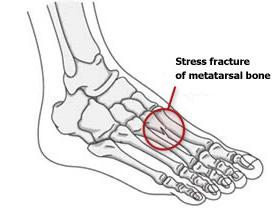Stress Fractures

One of the most common injuries in sports is a stress fracture. Overcoming an injury like a stress fracture can be difficult, but it can be done.
What is a stress fracture?
A stress fracture is an overuse injury. It occurs when muscles become fatigued and are unable to absorb added shock. Eventually, the fatigued muscle transfers the overload of stress to the bone causing a tiny crack called a stress fracture.
What causes a stress fracture?
Stress fractures often are the result of increasing the amount or intensity of an activity too rapidly. They also can be caused by the impact of an unfamiliar surface (a tennis player who has switched surfaces from a soft clay court to a hard court); improper equipment (a runner using worn or less flexible shoes); and increased physical stress (a basketball player who has had a substantial increase in playing time).
Where do stress fractures occur?
Most stress fractures occur in the weight bearing bones of the lower leg and the foot. More than 50 percent of all stress fractures occur in the lower leg.
Studies have shown that athletes participating in tennis, track and field, gymnastics, and basketball are very susceptible to stress fractures. In all of these sports, the repetitive stress of the foot striking the ground can cause trauma. Without sufficient rest between workouts or competitions, an athlete is at risk for developing a stress fracture.
Are women more susceptible to stress fractures than men?
Stress fractures affect people of all ages who participate in repetitive sporting activities, like running. Medical studies have shown that female athletes seem to experience more stress fractures than their male counterparts. Many orthopaedic surgeons attribute this to a condition referred to as "the female athlete triad": eating disorders (bulimia or anorexia), amenorrhea (infrequent menstrual cycle), and osteoporosis. As a female's bone mass decreases, her chances of getting a stress fracture increase.
What are the symptoms of a stress fracture?
Pain with activity is the most common complaint with a stress fracture. This pain subsides with rest.
How are stress fractures diagnosed?
It is very important that during the medical examination the Sports Medicine Specialist evaluates the patient's risk factors for stress fracture.
X-rays are commonly used to determine stress fracture. Sometimes, the stress fracture cannot be seen on regular x-rays or will not show up for several weeks after the pain starts. Occasionally, a computed topography (CT) scan or magnetic resonance imaging (MRI) will be necessary.
How are stress fractures treated?
The most important treatment is rest. Individuals need to rest from the activity that caused the stress fracture, and engage in a pain-free activity during the six to eight weeks it takes most stress fractures to heal. It may even require casting.
If the activity that caused the stress fracture is resumed too quickly, larger, harder-to-heal stress fractures can develop. Re-injury also could lead to chronic problems where the stress fracture might never heal properly.
In addition to rest, shoe inserts or braces may be used to help these injuries heal.
Prevention
Here are some tips to help prevent stress fractures:
- When participating in any new sports activity, set incremental goals. For example, do not immediately set out to run five miles a day; instead, gradually build up your mileage on a weekly basis.
- Cross-training -- alternating activities that accomplish the same fitness goals -- can help to prevent injuries like stress fractures. Instead of running every day to meet cardiovascular goals, run on even days and bike on odd days. Add some strength training and flexibility exercises to the mix for the most benefit.
- Maintain a healthy diet. Make sure you incorporate calcium- and vitamin D-rich foods in your meals.
- Use the proper equipment. Do not wear old or worn running shoes.
- If pain or swelling occurs, immediately stop the activity and rest for a few days. If continued pain persists, see a Sports medicine Expert .
- It is important to remember that if you recognize the symptoms early and treat them appropriately, you can return to sports at your normal playing level.
